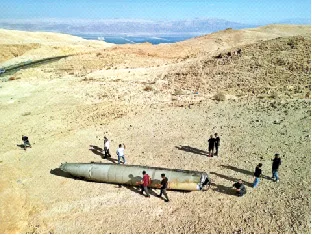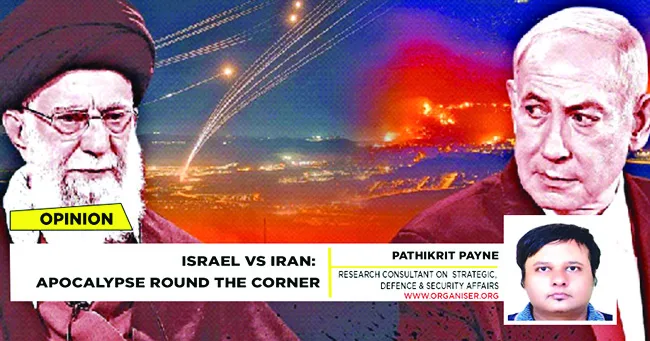Even as this article is being penned down, the world continues to wait with bated breath in anticipation of the trajectory the turmoil in West Asia is going to take. On the night of October 1, Iran rained Israel with a barrage of nearly 200 missiles, consisting of both ballistic and hypersonic types, some of which could easily even outmanoeuvre the much-acclaimed Iron-Dome and Arrow air defence systems of Israel. This, Tehran says, was in response to the killing of Hassan Nasrallah, Secretary General of Hezbollah, IRGC Commander Abbas Nilforoushan, and Ismael Haniyeh, the Chairman of Hamas Political Bureau. Iran’s missile-based blitzkrieg on Israel was preceded by Israel’s unprecedented and Sci-fi movie type detonation of nearly 4000 pagers, walkie-talkies and other electronic devices in Lebanon, that killed several hundred and injured thousands of top commanders and operatives of Hezbollah. This was followed by the assassination of Nasrallah in the command headquarters of Hezbollah in Southern Beirut, which witnessed use of 85 tons of explosives in a massive airstrike.
Israel, meanwhile, had also killed several other top commanders of specialised units of Hezbollah and had even struck Houthis with massive bombings on oil reservoirs, ports and other infrastructures. Hamas has already been severely crippled by continued airstrikes and ground operations.
Iran’s Ties with Hezbollah & Houthis
In a sense, Iran was not attacked by Israel. It merely went after Hezbollah, Houthis, Hamas, and a few other militias, some of which are based in Syria. Members of Iran’s elite IRGC were killed in strikes on Hezbollah, because of the close proximity between Hezbollah and Iran, and the regular movement of top Iranian generals to Lebanon for giving military and strategic guidance to Hezbollah.
Iran’s response further vindicates the deeply entrenched relation that Tehran has with the above-mentioned militias, most of which are designated as terror organisations by US and Western European countries. Some analysts in Israel define Iran as an octopus, with tentacles in the form of Hezbollah, Houthis, Hamas, a few more Iraq and Syria based militias. It is no more a secret how these entities have been funded, incubated, trained, armed and leveraged by Iran to wage a proxy war against Israel, and even against the major Sunni Arab states of West Asia. One must not forget how a Saudi led Sunni Arab coalition has been mired in a major conflict against the same Houthis, for almost a decade now. There have also been a series of massive terror strikes by Houthis, on critical infrastructures of Saudi Arabia and the UAE, with the use of loitering munitions, mostly of Iranian origins.

These armed militias give Tehran the plausible deniability pretext, and ensures that the theatre of conflict remains outside the geographical terrain of Iran. It must also be remembered that these are not run-of-the-mill militias or terror organisations. Houthis and Hezbollah have been armed by Iran with not just top-notch long-range rockets, but also short-range ballistic missiles and a very effective arsenal of loitering munitions that are low cost but extremely effective in unleashing swarm drone strikes.
Israeli Strategy: Cutting Tentacles?
In the aftermath of the October 7, 2023 attack by Hamas in Israel that killed nearly 1500 Israelis, the doctrinal approach of the Netanyahu Government, it seems, is to cut down the tentacles, and ensure that they too get decimated. Wave after wave of crushing assaults on Hamas, targeted attacks on the A-Team of Hezbollah, and decimation of infrastructure of Houthis, did have major impact. It compelled the head and mantle of the Octopus, call it Tehran, to emerge from the hive, react, and come to the rescue of the bleeding tentacles. Was it a bait by Israel to pull Iran directly into the conflict that for long it waged through the tentacles? Point to ponder.
Iran’s Catch-22 Situation
In a way, Iran had a catch-22 situation to deal with. On one hand, it knew that its economy may not be in a position to sustain a long-drawn conflict with Israel. It is too fragile, crippled further by sanctions. That was the core reason for creating the proxy militias to wage war on Iran’s behalf. However, Tehran was also under severe pressure perhaps to do something, for the sake of keeping its reverence among the Shiite militias and Hamas intact. There was perhaps increasing frustration among the ranks and files of Hamas, Houthis and Hezbollah, that while their members bleed to death fighting Israel, Iran, even while supplying them the needful, was officially staying away from the conflict that started in October last year. In April this year though, Iran did send a volley of rockets and drones inside Israel, after Israel had bombed the Iranian embassy in Damascus and killed two top Iranian generals. But that was seen as more of a tokenism than a real time opening up of a front against Israel.
However, the Iranian aerial assault this time was more than just tokenism. If not for anything else, it did definitely demonstrate that Iran does have the wherewithal to outmaneuver the Israeli air defence system. Iran used short-range ballistic missiles like Ghadr and Emaad, as well as its jewel-in-the crown hypersonic Fattah-2 missiles, that as per some estimates, can travel more than 15 times the speed of sound, and cover a distance of 1400 km to hit its targets with a maneuverable speed and trajectory. Even though there were no casualties, some of the missiles did fall near the Mossad headquarters and Nevatim air base.
Will Israel Retaliate?
The moot question in everyone’s mind right now is where would things go from here onwards. Would Israel go in for direct retaliation? It is highly unlikely that Israel would let Iran go off the hook without a formidable response. That response can be in the form of a direct attack on Iran’s crucial energy infrastructures, including refineries and reservoirs, nuclear installations, assassination of major leaders, or potentially a major strike in the heart of Tehran. From what one can gauge; Israel may not rush in with a response but would prefer to choose time and place of its own liking. None of the options are without chances of failure or apocalyptic escalation in the situation. Unlike Hezbollah or Houthis, Iran has a formidable air defence system, bolstered in the recent past by deployment of Russian hardware. However, going by Israel’s ability of precision strikes, electronic counter measure capabilities, sleeper cells all across and deep penetration proficiencies in cyber domain, success is not impossible either.
Meanwhile, it may also happen that Israel may not directly retaliate right away and instead opt for continued decimation of Hezbollah and Houthis’ capabilities with aerial strikes and limited ground operations. This too would hit Iran’s long-term plans hard.
The US And Russian Involvement
The involvement of the US naval fleet present in the region, in intercepting and thwarting many of the missiles targeted at Israel, has been crucial. It is also highly likely that the US may get involved in assisting Israel in case it decides to take the conflict into the heart of Iran. An Israeli strike inside Iran assisted by the US, has all the recipe for Russia to get involved in aid of Iran. Much like the US in case of the Russia-Ukraine conflict, where it provides the arsenal and tactics for Ukraine to wage the war against Russia, the Kremlin may take the same approach of arming Iran with capabilities to counter Israeli incursions, and even hit the American naval fleet in the region. One must not forget that only a few years back, Russia had sent a formidable fleet of combat jets and special forces units to ensure that the Assad regime did not collapse. Iran by that context is a closer ally of the Kremlin than even Syria.
Involvement of both US and Russia, in this face-off between Israel and Iran would mean that West Asia would become an extension of the Eastern European theatre of conflict that is now witnessing the war between Russian and Ukraine, on the cusp of expanding to rest of Europe. Russia may perceive the West Asian crisis as a perfect opportunity to hit back at Washington. Besides, the criticality of International North South Transport Corridor (INSTC), the multi-modal transport corridor that connects Russia to India through Iran, is too profound, to let Iran face the American ire on its own. INSTC is critical for Russia, to de-hyphenate from the Black Sea-Mediterranean Sea-Suez Canal route for maritime logistics, given the vulnerability Russian commodity carrying merchant ships may face there in the hands of NATO.
Additionally, Iran has been supplying Russia with a large array of loitering munitions and short-range ballistic missiles that are of immense value for Russia to sustain the war against Ukraine, whose arsenals are replenished by almost 30 odd countries of NATO. Russia may not have any direct problem or animosity against Israel, and itself has a very ruthless approach while dealing with terrorism. However, such are dynamics of geopolitics today that, Russia would have little option than to come to the aid of Iran, in the face of an Israeli assault.
Predicament of Sunni Arab States
An indispensable block in the whole scheme of things of West Asia is invariably the Sunni Arab states led by the likes of Saudi Arabia and UAE. Most of the Sunni Arab states have been measured in their response to a series of events since October 7 last year. Even as they have voiced their concerns from time to time on the issue of civilian casualties in Gaza due to Israeli airstrikes, in essence, most Sunni Arab states have no love lost for Hamas, Houthis or even Hezbollah. The growing prominence of Hamas, having strong allegiance to Muslim Brotherhood, has been an anathema for Arab monarchs, and even Egypt. Also, Houthis have been targeting critical installations in the UAE and Saudi Arabia for quite sometimes now. As a result, the Arab states do not mind witnessing them cut down to size by Israel. The likes of Saudi Arabia and the UAE, also know that eradication of these Iran backed militias is critical if India-West Asia-Europe-Economic Corridor or IMEEEC is ever to see the light of the day and function seamlessly. Further, the sectarian rivalry of Sunni Arab states with Iran, and Iran’s leveraging of these militias to spread its own dominance in the region is known to all.
While Israel’s actions against Iran backed militias or designated terror groups is one thing, the dynamics change altogether if Israel and Iran get involved into a full-fledged conflict. Sectarian differences notwithstanding, Muslim fraternity is an emotive issue among Muslims across the world. While the incumbent regimes of respective Sunni Arab states may have revulsion for the Iranian clerics in power in Tehran, the same cannot be said about Arab people. Anti-Semitism, or rather anti-Israel feeling, has been so deeply entrenched in the minds of Muslims that anyone who wages a frontal war against Israel instantly gets a cult-like status in their eyes. Right now, Iran is enjoying it.
Therefore, for the Sunni Arab states, even if they wish for neutrality and let Israel take on Iran’s regime, a regime they abhor, on the face of it they would find it very difficult to express their opposition to Iran during a potential conflict, for fear of popular uprising in their own countries.
For Bharat, the situation is far more complex than it seems. Israel is its major defence and economic partner. Bharat has to take a stand in favour of any fight against such non-state actors
The next few days therefore, would be very crucial. Escalating tensions and Israel’s direct retaliation may not be good news for the US either, especially with elections round the corner, and with the US already overstretched due to the conflict in Ukraine. The worsening security environment would create more problems for maritime trade passing through the Gulf of Aden and even the Strait of Hormuz. Besides, the possibility of major terror strikes in the region, or elsewhere, cannot be ruled out either.
The Bharatiya Context
For Bharat, the situation is far more complex than it seems. Israel is its major defence and economic partner. Bharat itself has been a major victim of terrorism, and therefore it has to take a stand in favour of any fight against such non-state actors. Therefore, India’s support for Israel in its fight against terrorism is a given. But at the same time, India has a functional relationship with Iran as well, which is crucial too. INSTC is as important for India as it is for Russia and Iran. Further, rising volatility in West Asia, with India’s major partners pitted against each other, is no good news for the global supply chains of crucial commodities, especially crude oil. With the world economy having barely returned on track, post the pandemic and Russia-Ukraine conflict, a new wave of turmoil in West Asia is already creating challenges in the form of disruptions in supply chains. New Delhi’s plan for emerging as a $5 trillion economy by 2026-27 would hit massive roadblocks if the conflict in West Asia goes out of control. Any escalation would only make things more catastrophic not just for West Asia but also for the rest of the world.
India, however, remains as one of the very few countries that is in talking terms with both Israel and Iran. Therefore, it may be in a position to mediate if ever a situation arises. That possibility though is still a distant dream for now. The world continues to wait with bated breath and hoping to avoid an apocalyptic conflict that can start any time soon.


















Comments